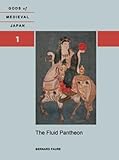The Fluid Pantheon: Gods of Medieval Japan
Material type: TextPublication details: Honolulu: University of Hawaiʻi Press, 2016Edition: Volume 1Description: 482 pages; 26 cmISBN:
TextPublication details: Honolulu: University of Hawaiʻi Press, 2016Edition: Volume 1Description: 482 pages; 26 cmISBN: - 9780824839338
- BQ4660.J3 F38
| Item type | Current library | Collection | Shelving location | Call number | Status | Date due | Barcode | Item holds | |
|---|---|---|---|---|---|---|---|---|---|
| Books | Asian University for Women Library | Non-fiction | General Stacks | BQ4660.J3 F38 (Browse shelf(Opens below)) | Available | 033075 |
Written by one of the leading scholars of Japanese religion, The Fluid Pantheon is the first installment of a multivolume project that promises to be a milestone in our understanding of the mythico-ritual system of esoteric Buddhism―specifically the nature and roles of deities in the religious world of medieval Japan and beyond. Bernard Faure introduces readers to medieval Japanese religiosity and shows the centrality of the gods in religious discourse and ritual; in doing so he moves away from the usual textual, historical, and sociological approaches that constitute the “method” of current religious studies. The approach considers the gods (including buddhas and demons) as meaningful and powerful interlocutors and not merely as cyphers for social groups or projections of the human mind. Throughout he engages insights drawn from structuralism, post-structuralism, and Actor-network theory to retrieve the “implicit pantheon” (as opposed to the “explicit orthodox pantheon”) of esoteric Japanese Buddhism (Mikkyō).
There are no comments on this title.
